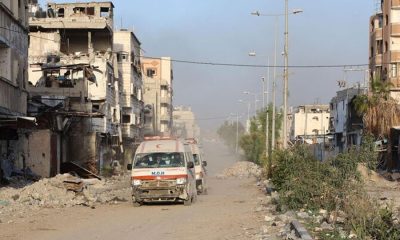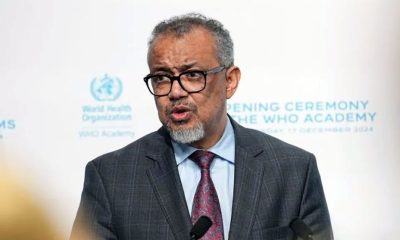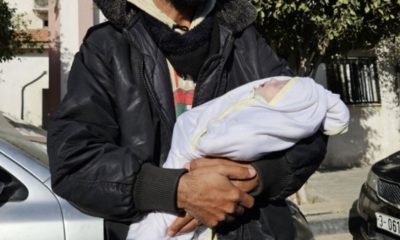International
Iran, allies ready Israel response as funerals held for militant leaders

Iran, allies ready Israel response as funerals held for militant leaders
TEHRAN: Iran and its regional allies vowed retaliation on Thursday for the deaths of Hamas and Hezbollah leaders, raising regional tensions as mourners filled Tehran’s city center calling for revenge.
A public funeral was held for Hamas’s political chief Ismail Haniyeh in the Iranian capital where he was killed early Wednesday in an attack which Israel has not commented on.
Haniyeh’s body was then flown to Qatar, where he had resided and where he is to be laid to rest on Friday, when his group called for a “day of furious rage” in the Palestinian territories and across the region.
Hezbollah chief Hassan Nasrallah, addressing the funeral of the Lebanese group’s top military commander, said Israel and “those who are behind it must await our inevitable response” to Fuad Shukr’s and Haniyeh’s killings within hours of each other.
“You do not know what red lines you crossed,” Nasrallah said, addressing Israel, a day after Shukr was killed in a strike in south Beirut.
Israel, which said Shukr’s assassination was a response to deadly rocket fire last week on the annexed Golan Heights, warned its adversaries on Thursday they would “pay a very high price” for any “aggression.”
“Israel is at a very high level of preparation for any scenario, both defensive and offensive,” Prime Minister Benjamin Netanyahu said in a statement.
“Those who attack us, we will attack in return.”
A source close to Hezbollah told AFP that Iranian officials met in Tehran on Wednesday with representatives of the so-called “axis of resistance,” a loose alliance of Tehran-backed groups hostile to Israel, to discuss their next steps.
“Two scenarios were discussed: a simultaneous response from Iran and its allies or a staggered response from each party,” said the source who had been briefed on the meeting, requesting anonymity to discuss sensitive matters.
The leader of Yemen’s Iran-backed Houthi rebels vowed a “military response” to Israel’s “major escalation.”
READ ALSO:
- Commercial activities shut down as protesting groups clash in Lagos, others
- 14 killed in nationwide protests, state govts, police respond
- BREAKING: Six youths killed as protest turned violent in Niger
Analysts told AFP that the retaliation would be measured to avoid a wider conflagration.
Iran and the groups it backs “will more than likely try to avert a war, while also strongly deterring Israel from continuing with this new policy, this targeted shock and awe,” said Amal Saad, a Hezbollah researcher and lecturer at Britain’s Cardiff University.
In Tehran, Iran’s supreme leader Ayatollah Ali Khamenei led prayers for Haniyeh having earlier threatened “harsh punishment” for his killing.
Crowds, including women shrouded in black, carried posters of Haniyeh and Palestinian flags in a procession and ceremony that began at Tehran University, an AFP correspondent reported.
Senior Iranian officials, including President Masoud Pezeshkian and Revolutionary Guards chief General Hossein Salami, attended the ceremony, state television images showed.
Iran’s Revolutionary Guards announced the day before that Haniyeh and a bodyguard were killed in a pre-dawn strike Wednesday on their accommodation in Tehran.
The New York Times however reported, citing anonymous sources including two Iranian officials, that the blast was caused by an explosive device planted several months ago.
When asked about the report, Israeli military spokesman Daniel Hagari told reporters “there was no other Israeli aerial attack… in all the Middle East” on the night of Shukr’s killing.
Qatar-based Haniyeh had been visiting Tehran for Pezeshkian’s swearing-in on Tuesday.
Pezeshkian said Iran “will continue to support with firmer determination the axis of resistance,” the official IRNA news agency said.
Qatar-based network Al Jazeera reported that the plane carrying Haniyeh’s body had landed in Doha, where the Palestinian leader is to be buried following prayers at the Qatari capital’s largest mosque.
Hamas called in a statement for a day of protests on Friday.
“Let roaring anger marches start from every mosque,” it said.
READ ALSO:
- Lagos: Police keep peace at Lekki tollgate protest
- Just in: 24-hour curfew declared in Kano over violent protest, massive looting
- Protesters angry over inclusion of Adeleke’s name on placards in Osun
Turkish President Recep Tayyip Erdogan called Haniyeh a “martyr” and announced a national day of mourning on Friday “in solidarity with the Palestinian cause.” Pakistan too announced a national day of mourning.
The international community has called for calm and a focus on securing a ceasefire in the Gaza Strip — which Haniyeh had accused Israel of obstructing.
United Nations chief Antonio Guterres said the strikes in Tehran and Beirut represented a “dangerous escalation.”
In a phone call, the foreign ministers of Jordan and Egypt blamed Israel for rising tensions and called for “de-escalation,” Jordan’s official Petra news agency reported.
US Secretary of State Antony Blinken reiterated appeals for an end to fighting and said achieving peace “starts with a ceasefire.”
But the prime minister of key ceasefire broker Qatar said Haniyeh’s killing had thrown the whole Gaza war mediation process into doubt.
“How can mediation succeed when one party assassinates the negotiator on the other side?” Sheikh Mohammed bin Abdulrahman Al-Thani said on social media site X.
US President Joe Biden will speak to Netanyahu later on Thursday, the White House said.
The killings are the latest of several major incidents that have inflamed regional tensions during the Gaza war which has drawn in Iran-backed militant groups in Syria, Lebanon, Iraq and Yemen.
Beyond Gaza, clashes continued on Thursday with Lebanese authorities reporting four Syrians killed in an Israeli strike, followed by Hezbollah announcing a barrage of “dozens” of rockets at Israel.
Israel has vowed to destroy Hamas in retaliation for its October 7 attack that resulted in the deaths of 1,197 people, mostly civilians, according to an AFP tally based on official Israeli figures.
Militants also seized 251 hostages, 111 of whom are still held captive in Gaza, including 39 the military says are dead.
Concern over the fate of those still held has grown among Israelis, who demonstrated demanding a deal to free them in Tel Aviv on Thursday, marking the war’s 300th day.
Israel’s retaliatory campaign against Hamas has killed at least 39,480 people in Gaza, according to the Hamas-run territory’s health ministry, which does not give details of civilian and militant deaths.
Iran, allies ready Israel response as funerals held for militant leaders
ARAB NEWS
International
Moscow attacks Ukraine with drones, missiles
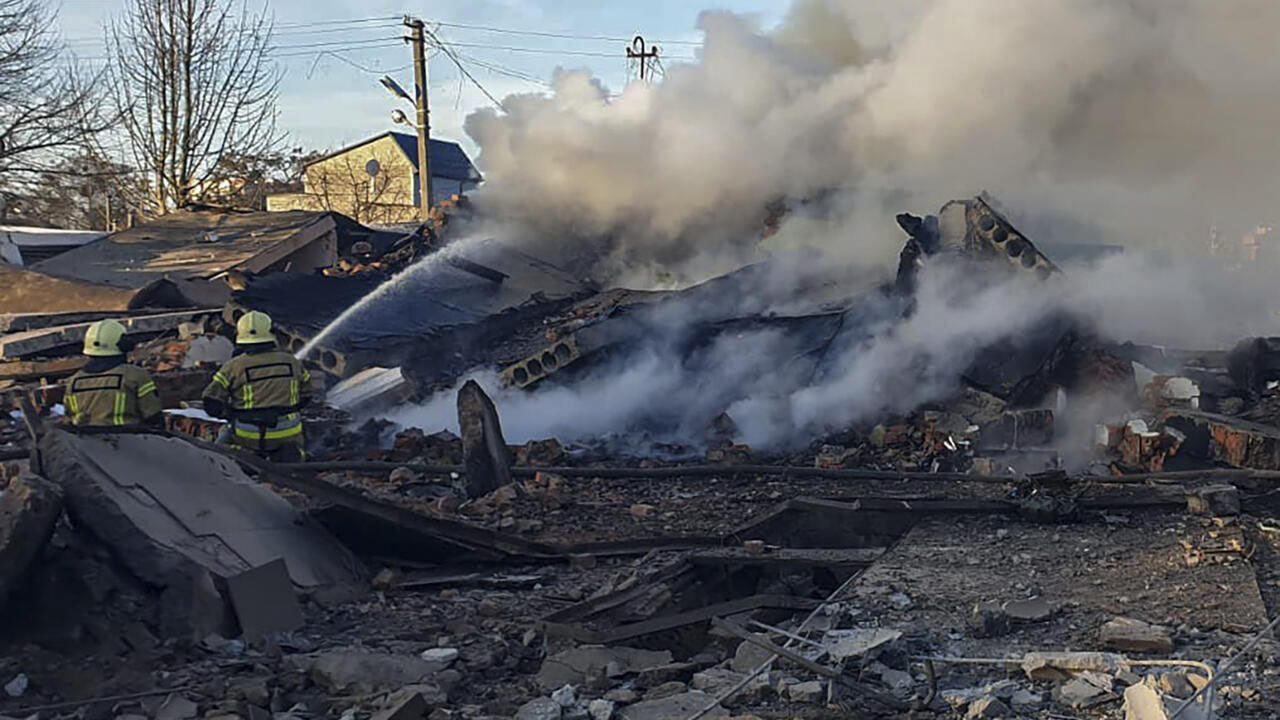
Moscow attacks Ukraine with drones, missiles
Kyiv said Tuesday that Russia had launched a barrage of drones and missiles across Ukraine, conceding that there were successful strikes in the east of the country and near the capital.
Authorities did not elaborate on what had been hit but in the wider Kyiv region, the governor said debris from a downed projectile had damaged a private home and wounded a woman.
Moscow said its forces had used attack drones and precision weapons in a “combined” assault on a military airfield and a munitions production facility, claiming that the targets were struck.
READ ALSO:
- Wanted terrorist commander, Bello Turji, a dead man walking – DHQ
- Court orders forfeiture of $49,700 linked to former INEC official
- DSS arrests activist Shehu Mahdi over post on French military base
The Ukrainian air force said Russia had launched 21 missiles of various types and 40 drones in the barrage, adding that seven missiles and 16 unmanned aerial vehicles were downed.
“As a result of the Russian attack, there were ballistic missile hits in Sumy and Kyiv regions,” the air force said.
Russia has launched aerial attacks on Ukraine at night almost every day since its forces invaded in February 2022, targeting military and civilian infrastructure, too, like energy facilities.
Ukraine has stepped up its own drone and missile attacks inside Russian territory in response, and urged its Western allies to supply more air defence systems.
A Ukrainian drone attack in western Russia caused a fuel spill and fire at an oil depot, a Russian regional governor said earlier Tuesday.
Moscow attacks Ukraine with drones, missiles
International
Catholic priest sentenced to 11 years for criticising his president
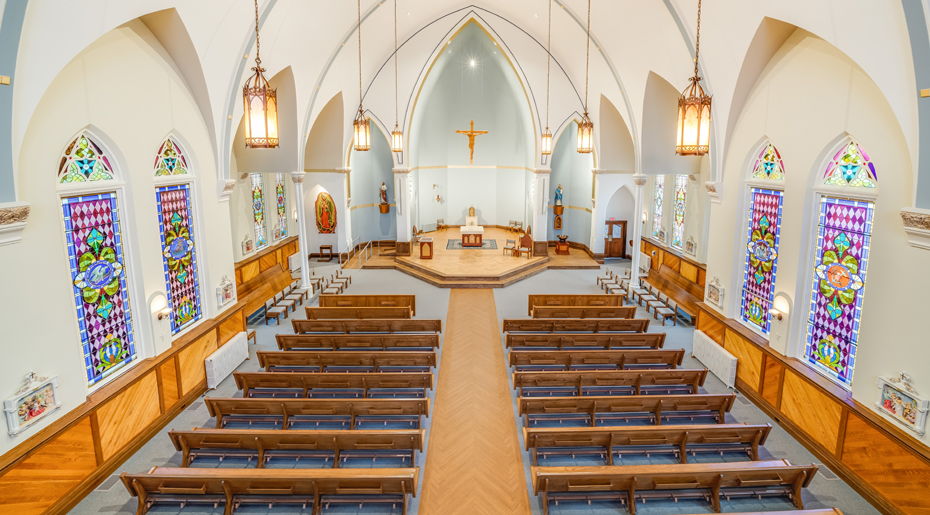
Catholic priest sentenced to 11 years for criticising his president
A Catholic priest in Belarus on Monday was convicted on charges of high treason for criticising the government and handed an 11-year sentence, in the first case of politically-driven charges against Catholic clergy since Belarus became independent after the Soviet Union collapsed in 1991.
The conviction and sentencing of Rev. Henrykh Akalatovich comes as Belarusian authorities have intensified their sweeping crackdown on dissent ahead of the Jan. 26 presidential election that is all but certain to hand authoritarian President Alexander Lukashenko a seventh term in office.
The Viasna Human Rights Centre said Akalatovich, 64, rejected the treason charges. The group has listed him among 1,265 political prisoners in the country.
“For the first time since the fall of the Communist regime, a Catholic priest in Belarus was convicted on criminal charges that are levelled against political prisoners,” said Viasna’s representative Pavel Sapelka. “The harsh sentence is intended to intimidate and silence hundreds of other priests ahead of January’s presidential election.”
Akalatovich, who has been in custody since November 2023, was diagnosed with cancer and underwent surgery just before his arrest. The priest from the town of Valozhyn in western Belarus, who was critical of the government in his sermons, has been held incommunicado, with prison officials turning down warm clothing and food sent to him.
Arkatovich is among dozens of clergy — Catholic, Orthodox and Protestant — who have been jailed, silenced or forced into exile for protesting the 2020 election that gave Lukashenko a sixth term. The disputed vote that the opposition and the West said was marred with fraud triggered mass protests,. The authorities then responded with a sweeping crackdown that saw more than 65,000 arrested and thousands beaten by police.
Catholic and Protestant clergy who supported the protests and sheltered demonstrators at their churches were particularly targeted by repressions. Belarusian authorities openly seek to bring the clergy into line, repeatedly summoning them for “preventive” political talks, checking websites and social media, and having security services monitor sermons.
While Orthodox Christians make up about 80% of the population, just under 14% are Catholic and 2% are Protestants.
Lukashenko, who has ruled Belarus for nearly 30 years and describes himself as an “Orthodox atheist,” lashed out at dissident clergy during the 2020 protests, urging them to “do their jobs,” and not fuel unrest.
Lukashenko is one of Russian President Vladimir Putin’s closest allies, allowing Russia to use his country’s territory to send troops into Ukraine in February 2022 and to deploy some of its tactical nuclear weapons in Belarus.
Catholic priest sentenced to 11 years for criticising his president
International
Second South Korea Jeju Air flight suffers landing problem
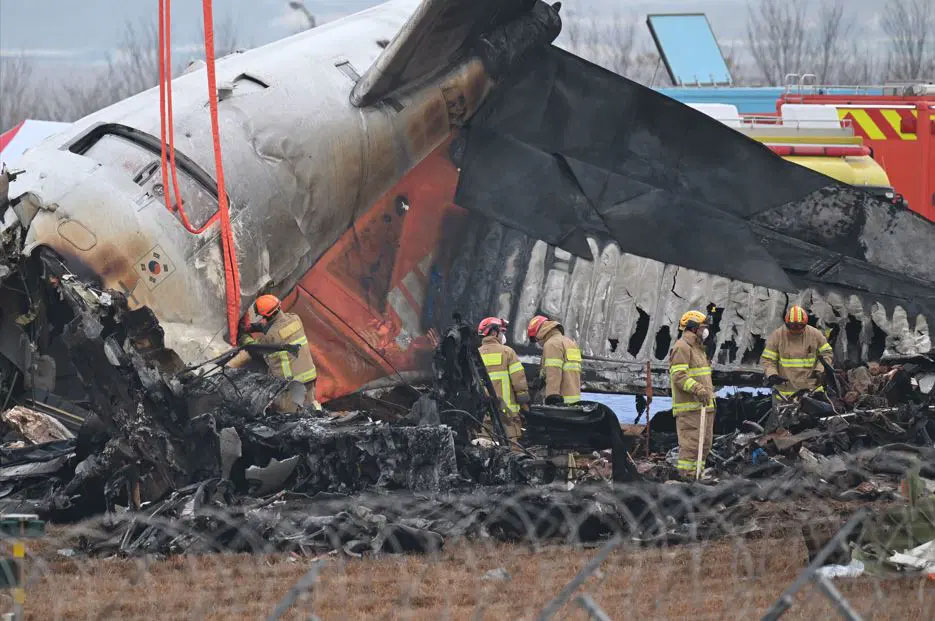
Second South Korea Jeju Air flight suffers landing problem
A Jeju Air flight from Seoul on Monday was forced to return after encountering a landing gear problem, the airline said, a day after South Korea’s most deadly plane crash.
The Boeing 737-800 involved in the latest incident was the same model as the Jeju Air plane that crashed on Sunday killing 179 people after coming down without its landing gear engaged.
Jeju Air Flight 7C101, which departed Seoul’s Gimpo International Airport for Jeju island “at around 6:37 am, returned to Gimpo at 7:25 am” after a landing gear issue was detected shortly after takeoff, the South Korean airline said.
“Shortly after takeoff, a signal indicating a landing gear issue was detected on the aircraft’s monitoring system,” Song Kyung-hoon, head of the management support office at Jeju Air, told a news conference.
“At 6:57 am, the captain communicated with ground control, and after taking additional measures, the landing gear returned to normal operation. However, the decision was made to return to the airport for a thorough inspection of the aircraft.”
READ ALSO:
- 50% fare slash: Luxury bus owners increase trips as more travellers throng parks
- Abducted 7-year-old girl rescued in Ogun, kidnapper arrested
- ABU Teaching Hospital will begin kidney transplant in 2025 – CMD
Local media reported that 21 passengers chose not to board an alternate flight to Jeju, citing concerns over safety and other reasons.
Jeju Air’s 41 plane fleet includes 39 Boeing 737-800 aircraft.
Seoul said on Monday it would conduct a special inspection of all 101 Boeing 737-800 planes in operation in the country, with US investigators, possibly including from plane manufacturer Boeing, joining the probe into the crash.
“We are reviewing plans to conduct a special inspection on B737-800 aircraft,” said Joo Jong-wan, head of the aviation policy bureau at the South Korean transport ministry.
Joo added that the government plans to “implement rigorous aviation safety inspections in response to the (landing gear) incidents”.
In Sunday’s crash at Muan, the Boeing 737-800 carrying 181 people from Thailand to South Korea made a mayday call and belly-landed before crashing into a barrier and bursting into flames.
Everyone on board Jeju Air Flight 2216 was killed, save two flight attendants pulled from the wreckage.
Second South Korea Jeju Air flight suffers landing problem
-

 Politics3 days ago
Politics3 days agoGbajabiamila speaks on his rumoured Lagos governorship ambition
-

 metro2 days ago
metro2 days agoFarotimi to pursue disbarment over arrest, defamation allegations
-

 Business2 days ago
Business2 days agoReal reason Dangote, NNPC drop petrol price — IPMAN
-

 Health2 days ago
Health2 days agoABU Teaching Hospital will begin kidney transplant in 2025 – CMD
-

 Sports23 hours ago
Sports23 hours agoAnthony Joshua prostrates before Governor Abiodun during Ogun visit
-
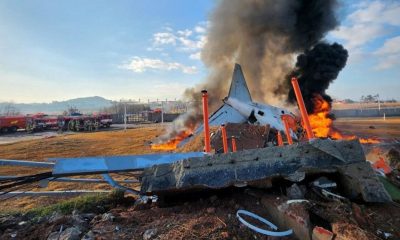
 International3 days ago
International3 days agoBREAKING: Plane skids off runway in South Korea, killing at least 120
-

 metro3 days ago
metro3 days agoEl-Rufai accuses Tinubu govt of Yoruba agenda, Reno Omokri reacts
-

 metro2 days ago
metro2 days agoNigerian govt urged to intervene in Mozambique post-election violence

